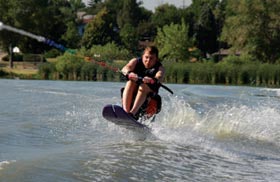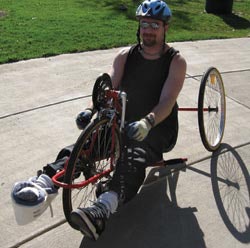As budgets tighten, recreation agencies struggle to truly accommodate individuals with disabilities.

But talk further, and the theme of hope is clouded by some troubling trends regarding inclusion in parks and rec departments. Devine's own research, including focus groups and a 2006 survey responded to by 767 agencies, compares how attitudes and practices regarding inclusion compare with those outlined in a similar nationwide survey done in 1996.
"There is some not-so-good news," says Devine. "Financial resources are now very thin." The result, she says, is that inclusive recreation programming - for people with all types of intellectual and developmental disabilities - is now being predominantly led by staff members with general recreation backgrounds, rather than people with therapeutic or specialized adaptive recreation backgrounds. According to Devine's data, generalists now comprise more than half of the practitioners leading inclusive programs, which means that "many staff members are grossly under-qualified," especially for dealing with behavioral issues, she says. "Departments are running into problems, both legal and safety-related, because many people are not equipped to do this work."
Training is essential, and North Las Vegas inclusion coordinator Jana Salisbury says she was encouraged to see so many general recreation practitioners actively engaged and involved at NIRI this year. "We have a lot more generalists than ever who are coming to NIRI, because they are having to do more with less," says Salisbury, who is also a NIRI program chair. Salisbury is among the practitioners of inclusive recreation programs who warn that despite the funding issues faced by many agencies, demand for inclusive programming will be increasing exponentially in the next few years as baby boomers age, as war veterans return from overseas with physical disabilities and, especially, as children with disabilities of all types grow to expect full menus of recreation options.

Despite this social trend, 66 percent of agencies responding to Devine's survey said they didn't perceive much local demand for inclusive recreation services. Another of Devine's findings can perhaps explain this discrepancy. "Agencies are not doing target-marketing toward people with disabilities," she says. "They're not seeking out people to engage in their programs as they are with seniors and teens." Asks Salisbury, "Do you have a picture on the cover of your brochure of three kids that look exactly the same, or do you have pictures of people from all walks of life? Is your inclusion statement shown on your cover, or is it buried and written in a font that nobody can read? What you portray is what you're going to get out of your program."
Another budget-related challenge facing providers of inclusive recreation is that fewer departments are willing to devote resources needed for more specialized programming. The result is that more truly inclusive programming - in which people with disabilities join in programs alongside people without disabilities - is taking place, regardless of the level of staff experience in dealing with behavioral issues or program modifications, or the availability of specialized equipment.
"Because it's more fiscally responsible, people are trying more to create inclusion in programs that are already set, and it is the generalists who are being tasked with providing the services," says Salisbury. In such circumstances, people with disabilities are also more subject to the fears and discrimination of untrained staff or other participants. The danger, says Aden, is that "years of appropriate inclusion can be ruined by one bad experience."
In collecting data from focus groups, Devine was disheartened to find that the obstacle of social bias has not changed much over the past 12 years. "Among folks in the community, there is still a lot of stigma that surrounds the idea of someone with a disability sharing in the same art class, in the same after-school activity or on the same baseball team," she says. "A few professionals told me that they have had parents pull their kids out of programs because they didn't want them even associated with someone with disabilities."
Though eradicating such bias may seem impossible, Salisbury believes establishing a clear-cut, department-wide philosophy of inclusion can at least combat it. "People need to have an inclusion statement that's not just smoke and mirrors," she says. "Have documentation that says, 'We welcome everybody, and if you need an accommodation or modification, please notify us so we can make it possible.' "
Salisbury also believes in creating a set of policies and procedures for administering inclusive programming. "At what age can children begin participating in your program?" she says. "Are you going to provide personal care or not provide it? What precautions are you going to take for travel? Will your destination be accessible?"
While these types of specifics can help protect administrators from legal claims under the Americans with Disabilities Act, they more importantly create a welcoming atmosphere for persons with disabilities, and make the department's attitude toward inclusion visible to other members of the community. "You've got to be firm with your documentation," says Salisbury. "Sometimes you do have to let people know, 'This class is for everybody, and if you are uncomfortable with that, you can withdraw - because I'm not going to tell this child with a disability that he or she can't participate.' It's about standing your ground."
Official communications regarding inclusive programs should be enhanced by regular informal communication with staff members who - regardless of whether they harbor biases toward people with disabilities - may have little direct training related to modifying programs or dealing with behavioral issues. "A big part of our job is to be educators - to talk to other staff and introduce them to participants, and break down those initial barriers," says Leah Huffer-Solomon, who supervises a staff of 17 full- and part-time employees in the Denver Parks and Recreation Department's Special Needs Program. "On a daily basis, we're educating the general recreation staff. We've done sensitivity training for all of the recreation center supervisors in Denver."
Devine has found that many agencies are turning to resources outside their department - such as the local chapters of the ARC of the United States or United Cerebral Palsy - for training and partnership opportunities. "They're asking them if they can help train their staff, if they have adaptive equipment they can borrow, if they have a volunteer bank they can tap into for occasional one-on-one assistance," says Devine. "Sometimes, agencies are using people with disability-specific backgrounds - TR or adaptive PE people - on a contract basis."
Though many agencies with limited resources dedicated to special needs programming have found success with a combination of these strategies, there are still, as Devine notes, agencies "that are virtually doing nothing at all" to respond to their community's special needs populations. "When one group of people is marginalized, we are all marginalized," she says. "But when we engage in activities together, we are all more informed and more tolerant. Unfortunately, the general stigma that's helping to prevent that hasn't been addressed much in the past 10 years."
































